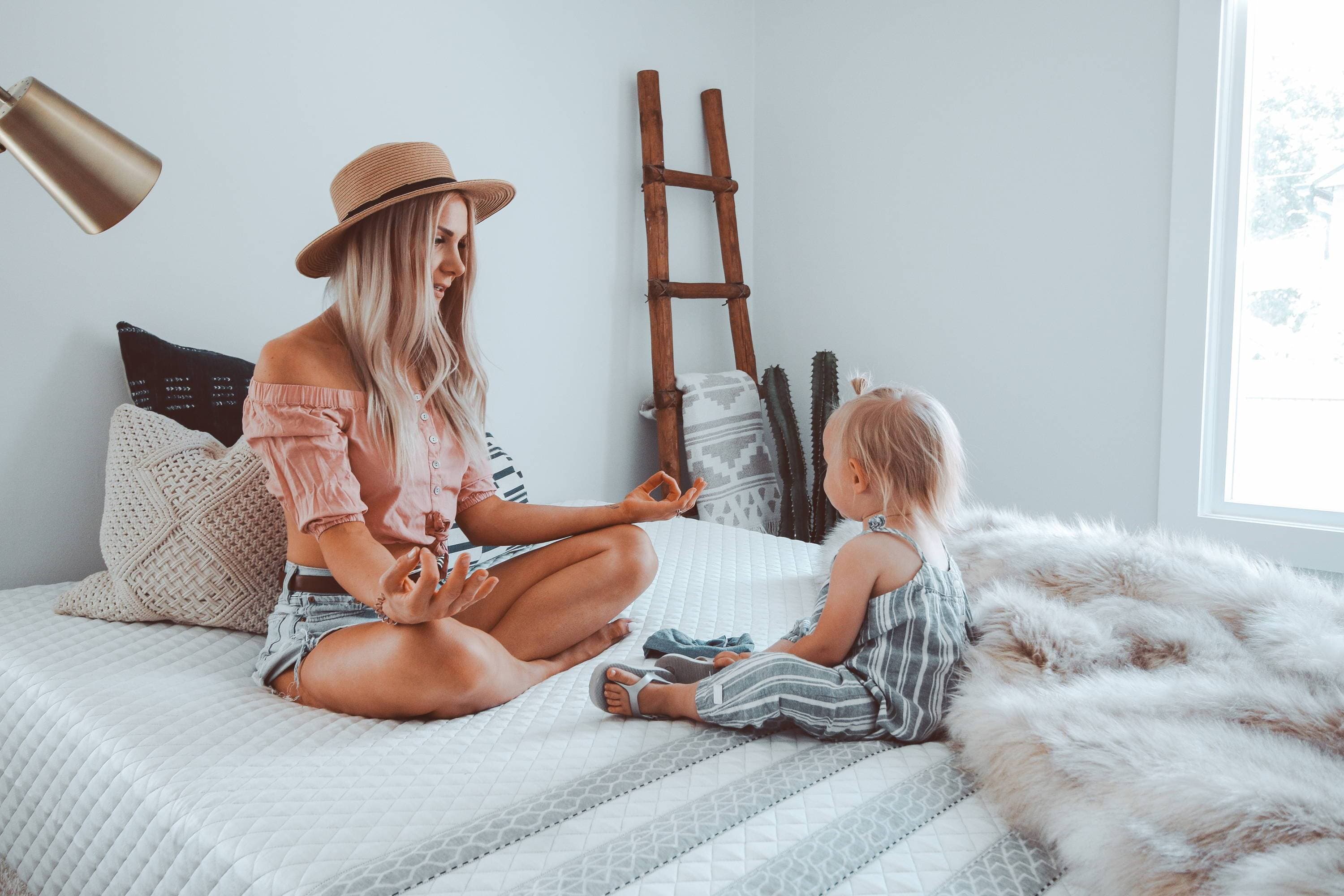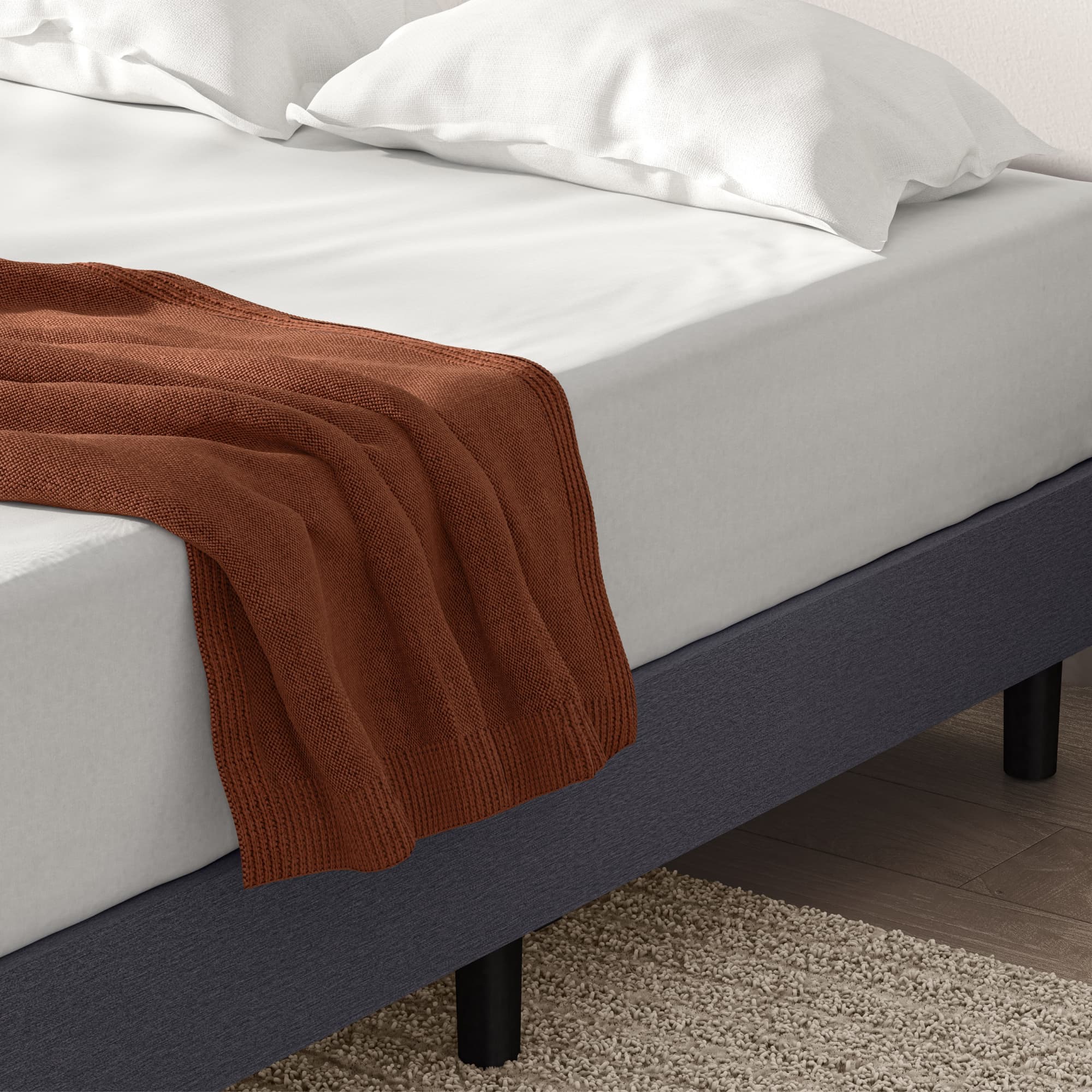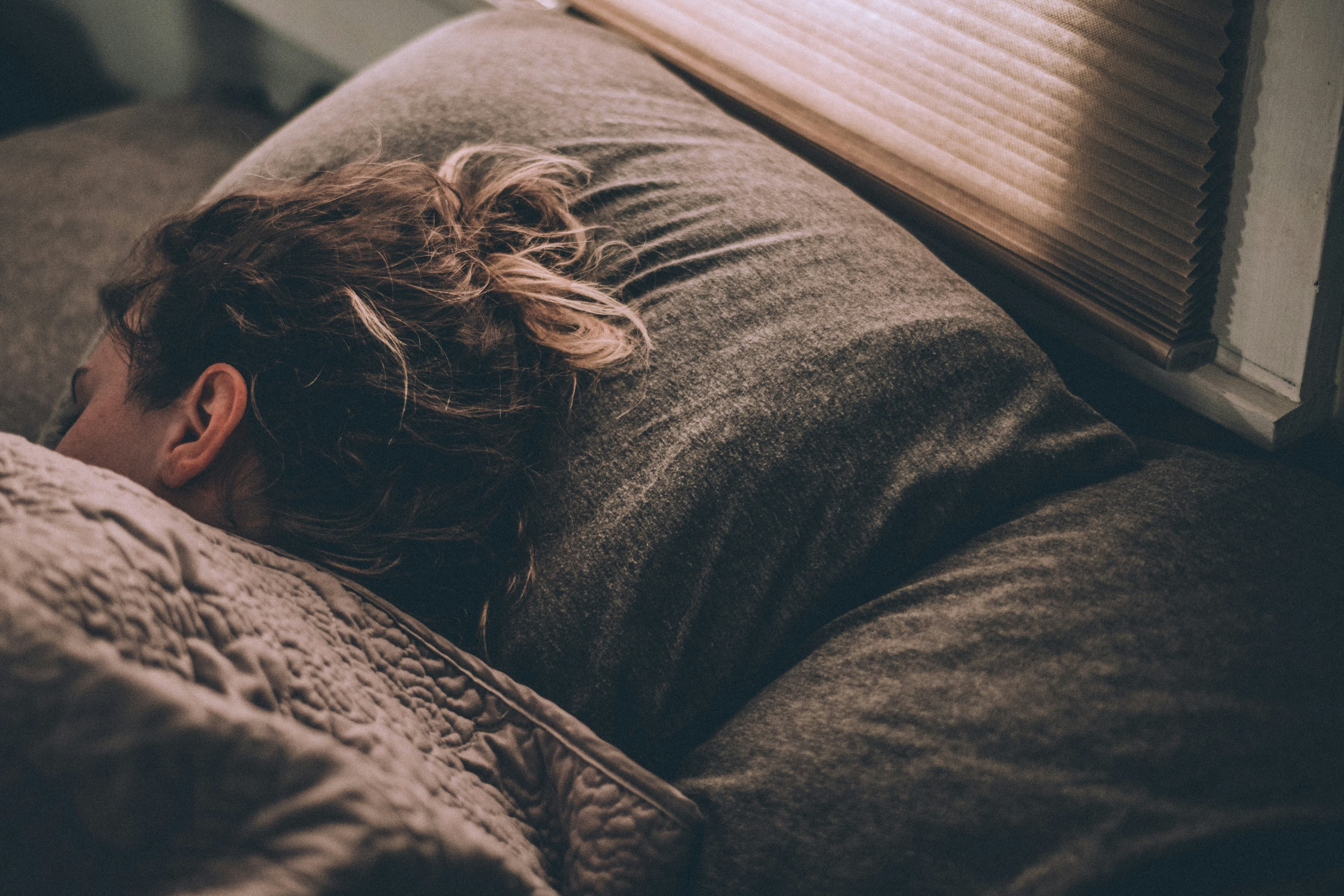At Leesa, sleep is kind of our thing. The importance of a good night's sleep can't be understated. You need sleep to function (just like you need food and water). And lack of sleep can lead to some serious issues.
When you sleep, your body recharges, allowing your brain to process the day’s information and reset all your chemical balances. That way you’re ready to wake up and tackle the next day. If you suffer from insomnia, you may be desperate for some help. And there is some — meditation for insomnia.
With the hustle and bustle of everyday life, from driving a carpool to slaying your work presentation to stopping by the grocery store on your way home, it can be tough to wind down when it’s time to go to bed. This is why meditation for insomnia can be just what your body and mind need.
Trust us, after spending the day working on ways to help you sleep better. With better mattresses, better bases, better pillows, better blankets. We sometimes have trouble turning off our brains to catch some zzz's, too. Not to mention, once you’re asleep, getting up when the alarm goes off and kicking into gear can also be a challenge. But just like we’re always improving our products, we want to help you improve the way you sleep.
How Can Meditation Help With Sleep?
Meditation before bed can help you turn off your brain and fall asleep faster, so you sleep better and longer. You can find guided meditations online, from simple meditations on Pinterest to websites that will talk you through them. There are also apps you can download that offer meditation, breathing exercises, and white noise. And there are specific types of meditation for insomnia.
Vipassana meditation is a popular pre-bedtime technique that helps quiet the thoughts floating around in your head. This practice encourages you to focus on something simple, like your hands, your feet, or the sound of your breathing, helping you clear your mind and reduce stress.
You can also try incorporating some yoga into your bedtime routine. (You can even do these poses in bed!) Try laying on your back with your legs extended up the wall, sitting cross-legged. Then try twisting to one side in a stretch, or rocking back into a child’s pose. Hold each position as long as they’re comfortable, and feel your heart rate slow as you start to relax.
Let’s Get Zen
Don’t roll your eyes — hear us out. There are proven physical, mental, and emotional benefits to meditation for insomnia and yoga. From improving your focus and concentration to lowering your stress levels and blood pressure. Scientifically speaking meditation releases endorphins in your brain (that’s a good thing) and stimulates activity in the part of your brain that controls emotions, specifically positive ones.
Keep in mind that meditation for insomnia can be different for everyone and greatly depends on your personal preferences. Some people like to have an instructor guide them through, using a soothing voice in a low tone, but some people find that weird. Maybe soft music is more your style. With some experimentation, you can find the meditation technique that works best for you. You can also vary how long you meditate. If you want to meditate for an hour, great. If you only have 10 minutes, that’s fine too.
Why not give it a try? If you suffer from insomnia or just have trouble falling to sleep sometimes? These meditation and yoga practices may help you get to sleep faster, sleep better, and wake up feeling more rested.
How to Meditate
Find Your Happy Place
Choose a space that feels safe and calm. Or meditate lying down once you've gotten into bed.
Set a Time Limit — and Your Intention
If you’re beginning to practice meditation, it can be helpful to keep your first sessions short — like five or 10 minutes. Also, set your intention — the purpose that you're meditating. Do you want to sleep? Do you want better clarity and focus? Do you simply want to calm down?
Focus on Your Breath
Breathe in and out slowly. Notice your breath — is it shallow or deep? Is it fast or slow? To get the best breath while meditating, try breathing from your diaphragm, rather than just your lungs.
Pay Attention to When Your Mind Wanders
Our minds think, so when your attention leaves your breath and wanders off, take note, reset, and refocus on your breath. Don't judge yourself if your mind wanders. Simply focus on the breath again.
Be Kind to Yourself
When it's time to complete your meditation, open your eyes, lift your gaze, and notice how your body feels. How are you feeling? What are you thinking about? What do you hear?
Of course, if you're meditating for insomnia, you want to skip that last step. Especially since most times, you'll have already fallen into a deep sleep.
Body Scan Meditation
Body scan meditations are a great way to relax and fall asleep. They can also help manage pain. You start laying down and begin the scan at the top of your head, focusing on any sensations you may feel.
Move downward onto your face, relaxing your forehead, the muscles around your eyes, your mouth, and your jaw. Then move on to your neck and shoulders, your arms, and so on. At the end of the body scan, you may have already fallen asleep. If you haven't, you can start again at the top of your head. You can find free body scan meditations here and here .
Deep Breathing
The 4-7-8 breathing technique, popularized by Dr. Andrew Weil, is a classic deep breathing exercise that can reduce anxiety, or put you to sleep quickly. This breathing is based on pranayama breathing in yoga, which focuses on controlling the breath for relaxation, or focus.
Morning Meditation to Start Your Day
Just like meditating before bed helps clear your mind for sleep, meditation in the morning can jumpstart your day. While nighttime meditation is more soothing and tranquil, morning meditations are meant to help you concentrate and feel energized.
One of the major benefits of meditation is increased focus. Even just 10 minutes of meditation in the morning can help you experience better concentration during the day and achieve your goals. Again, you can find some great guided morning meditations online that will get you started. Remember, there isn’t one right way to meditate, so find a routine that works for you and stick to it.
In the morning especially, yoga can help get you going. Whereas yoga you do before bed is very static and slow, morning poses are meant to get our blood flowing. Sun salutations are a classic yoga practice for the morning and are very energizing. You can also try the cat and cow poses. On all fours, expand and contract your spine, holding each position for a few seconds. Another good morning pose is a spinal twist: lay on your back, pulling one leg across for a stretch. Once again, these poses can be done on the floor or in bed.
Benefits of Meditation for Insomnia
The benefits of meditation are vast. Medical doctors have finally seen the light and are endorsing meditation and mindfulness for their patients. Some benefits of meditation for insomnia include:
Reducing blood pressure
Reducing stress, anxiety, or depression
Improving chronic pain
Enhancing the quality of sleep
Reducing substance abuse
Reducing symptoms of PTSD
Promoting weight loss
Improving symptoms of ADHD
Are There Any Dangers in Meditation?
Even though there are many benefits to meditation, there are a few dangers that you should be aware of. Some meditation techniques can make you cry, feel tired, or even gain weight! Other side effects include increased anxiety and depression, panic attacks, headaches, seizures, and hypersensitivity to light and sound.
While these are certainly scary side effects, you can take steps to avoid them by learning how to meditate safely. Find a trusted practitioner and learn the best meditation techniques for you. As a beginner, go slowly, limit the amount of time you spend meditating and stop immediately if anything feels wrong.
Find the Right Mattress for Better Sleep
Of course, good sleep starts with the right mattress. The Leesa mattress is the perfect balance of comfort and support — it’ll have you saying “namaste" as soon as you lay down. Our mattress is the perfect base for all things yoga, meditation, and most importantly, better rest.
Ready to upgrade your bed and start sleeping better? Let Leesa help you get zen.
FAQS
What is sleep meditation?
Sleep meditation, or meditation for insomnia, is any type of meditation technique that helps you get to sleep and stay asleep longer. Techniques include mindfulness, guided meditations, and deep breathing, all of which are great meditations for insomnia.
What is the best meditation for insomnia?
Most people suffering from insomnia find that guided meditations work well.
How can I calm my insomnia?
One of the issues with insomnia is it creates anxiety. Of course, we all want a good night's sleep. But if your mind focuses on the fact that sleep is elusive, it starts spinning in circles. Rather than focusing on insomnia itself, focus on your breath and relaxing the inevitable tense muscles that anxiety causes. Find a meditation technique or app that works for you and make your practice regular, for best success.



